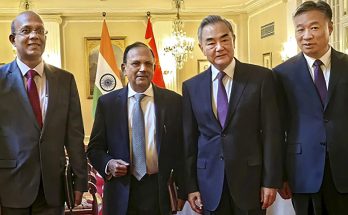
Projecting the Belt and Road Initiative (BRI) as a pathway to international prosperity, China has rejected allegations of pushing developing countries into a debt trap and underscored that BRI seeks to build a shared future of mankind amid “rising protectionism and bullying.”
“In today’s world, we see a trend of rising protectionism, unilateralism, bullying and anti-globalization. We hope to pool strengths for closer international cooperation through the BRI,” China’s Vice Foreign Minister Le Yucheng’s told the Financial Times in an interview.
Mr Le underlined that “given the current international landscape,” and “represents a useful effort in building a more fair and equitable new international order and in the reform of the global governance structure.”
Amid growing outcry in sections of the western media about BRI plunging recipient countries into debt trap, China’s vice foreign minister vehemently rejected these charges and cited facts and figures to prove his point.

“China is a latecomer in international investment and financing markets. It’s just been five years since the BRI was put forward. And it hasn’t been that many years since Chinese companies started to explore the global market. So one should not hold China accountable for all the debts.”
Alluding to criticism about China’s role in Sri Lanka’s mounting debts, Mr Le stressed that China only accounts for about 10% of Sri Lanka’s total foreign debt of over US$50 billion. “Over 60% of Chinese loans are concessional loans, with an interest rate much lower than the international level,” he said.
“The country has also borrowed from other sources, the ADB 14%, Japan 12%, and the World Bank 11%. China only accounts for about 10%.”
He clarified that “the sovereignty over and ownership of the Hambantota port belong to Sri Lanka throughout the process.”
“When it is done, if it so needs, Sri Lanka can repurchase part of or all stakes from the Chinese company until it takes it all back.”
‘India has benefited from BRI’

India has voiced reservations over various aspects of OBOR. India has opposed OBOR on grounds that CPEC passes through Pakistan-occupied Kashmir and amounts to violating the country’s sovereignty. Alluding to these reservations, Mr Le said: “I know that although China and India may not see eye to eye on every issue, the two countries face similar development agenda. This year, President Xi and Prime Minister Modi met three times. One important consensus they reached is that China and India need to be cooperation partners that support each other in realizing their respective dreams.”
“China-India relationship is now in a new stage and showing a new momentum,” he said.
“India may have its own views on the BRI. But China and India are cooperating closely on practical projects. TBEA, a Chinese company, has set up an industrial park in Gujarat, which is welcomed by the local community.”
“China is also helping India increase the speed of its existing railways and build new railway stations. The two countries are also working on Bangladesh-China-India-Myanmar Economic Corridor. In addition, India is a founding member of the AIIB. About 20% of the projects funded by AIIB are in India. So India has gained tangible benefits from the BRI,” he said.
Author Profile
- India Writes Network (www.indiawrites.org) is an emerging think tank and a media-publishing company focused on international affairs & the India Story. Centre for Global India Insights is the research arm of India Writes Network. To subscribe to India and the World, write to editor@indiawrites.org. A venture of TGII Media Private Limited, a leading media, publishing and consultancy company, IWN has carved a niche for balanced and exhaustive reporting and analysis of international affairs. Eminent personalities, politicians, diplomats, authors, strategy gurus and news-makers have contributed to India Writes Network, as also “India and the World,” a magazine focused on global affairs.
Latest entries
 India and the WorldJune 26, 2025Operation Sindoor: India Sheds Restraint, Rediscovers Utility of Force
India and the WorldJune 26, 2025Operation Sindoor: India Sheds Restraint, Rediscovers Utility of Force India and the WorldJune 23, 2025BRICS summit in Rio to focus on Global South, local currency trade
India and the WorldJune 23, 2025BRICS summit in Rio to focus on Global South, local currency trade Africa InsightsJune 11, 2025New Opportunities in India-Japan Cooperation in Africa
Africa InsightsJune 11, 2025New Opportunities in India-Japan Cooperation in Africa India and the WorldMay 23, 2025Post-Operation Sindoor, India reminds Turkey, China of concerns and sensitivities
India and the WorldMay 23, 2025Post-Operation Sindoor, India reminds Turkey, China of concerns and sensitivities







